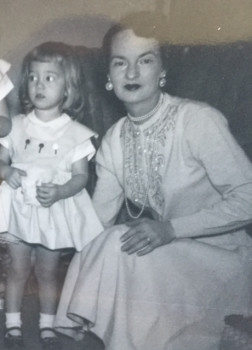Tilling Forgiveness Through Love

As we pursue deep and lasting healing through engagement with our stories of harm, we often find that the level of kindness we can offer ourselves is connected to the kindness we offer others. Here, Becky Allender writes about the painful work of learning to forgive her younger self and her mother as she lets herself be re-parented through her own children and grandchildren. This post originally appeared on Red Tent Living.
I loved my mother but she never was a safe person. This is a complicated dilemma for a toddler or a teenager. It complicated my whole life. It wasn’t until the past few years that I have been able to enter a new level of forgiveness through an understanding of attachment.
My mother was a child of the Great Depression, and she lived with a ferocious tenacity to never suffer the shame of poverty again. Her mother was flighty and not quite grounded in reality, and never seemed to get things done on time except for getting to church.
Her father died of melanoma when she was thirteen, and her two younger brothers were then placed in an orphanage while her mother worked as a social worker in the ranch country of Throckmorton, Texas. My mom was an adult way before she ever had the opportunity to be a child.
No wonder there was little place for me to be a child. I was allotted the privilege to be a child with my dad, but my mom expected me to strive to make life work just as she had done. Our home was never a place of rest, and she never ran out of chores for us to do.

After she married, she hit the ground climbing the social ladder of life. In the 1950s it was the surgeon and lawyer wives that wielded their power, and she joined right in regardless. As a three-year-old, I accompanied her to philanthropic meetings at all hours of the day. I knew to be silent in the car and wandered in the yards of the hostesses during the meetings. At home I played quietly in my closet or outside in order not to bother my mother, who had so much work to do—all the way to her grave.
If you want to dig deep it is easier with soft, supple dirt than rock hard soil. Attachment allowed the soil of our relationship to be tilled. I have forgiven my mother many times for failing me. I have asked for forgiveness many times for not engaging her with the heart of Jesus. But in recent years, an understanding of our attachment needs softened the dirt to allow the work of forgiveness to go deeper than it has ever gone. Forgiveness is like a shovel; it only penetrates as far as the ground will permit.
The core desire of the heart is attunement—meaning for someone to be fully and deeply aware of what we feel, desire, and need. This most basic desire seemed to me to be my most central flaw. I thought that if I could only erase the desire to be seen by my mother, then my relationship with her would be on stable ground.
As much as I wanted to say “To hell with you,” I always, in fact, wanted to please her. As much as I resented her, I then condemned myself more for not appreciating her. How odd to think that as much as I needed to forgive her, I needed as much to forgive myself for being human. It was right for me to want to have her eyes and her delight.
I had the immense privilege of birthing two daughters and a son. I remember being infatuated with my own babies. I was happily married, yet having a baby of my own raised the bar for love. I didn’t know it at the time, but I was being given the opportunity to re-parent my own heart as I delighted in their beautiful faces.
Now, I am the grandmother to two stunning boys and two glorious girls. I not only get to play and live into their imagination, but I also get to watch their remarkable parents delight in their children. Dan has said often that as much as we love our grandchildren, we love as much, if not more, watching our children parent our grandchildren.
Simply to be in the presence of Sassy as she works out problems with Elsa in a calm, kind manner is healing. To hear our daughter, Annie, laugh with her boys as they tumble on the floor is life giving. To see the bond between Amanda and Grace in their cooing is enough to bring tears of joy.
I ponder what happened to my mother that caused her to scream in fury: “Dumb, Dumb Dora” if I got in her way or didn’t run fast enough to get into the car. What drove her to cut branches from a bush to beat me if my tone of voice was not correct?
I have the privilege of babysitting my three-year-old granddaughter and cannot imagine her mother screaming at her. I cannot imagine her playing in a dark closet to keep from annoying me or anyone else. I can’t allow myself to imagine the dark shadow that cover her life if she had to hate the delight she is offered so readily and easily.
As I place my young self in Elsa’s exuberant life, I can only grieve for the equally beautiful three-year-old Becky who would have been a radically different young woman if my mother were like my daughters or daughter-in-law. It is this grief and blessing that enables me to look at my mother’s driven, confused, trauma-filled life and long for her to know how much I ache for her and want for her to know joy.
The kinder I allow my heart to be to a young three-year-old Becky, the more I can grieve for the mother who had no idea how to let her be a little girl. And as odd as it may sound, the kinder I am to my mother who failed, the more I can let my daughters and daughter-in-law mother me through the care of their children. By tilling the soil of our lives, forgiveness digs up the dirt to allow new seeds to be sown and old ground to become young again.
